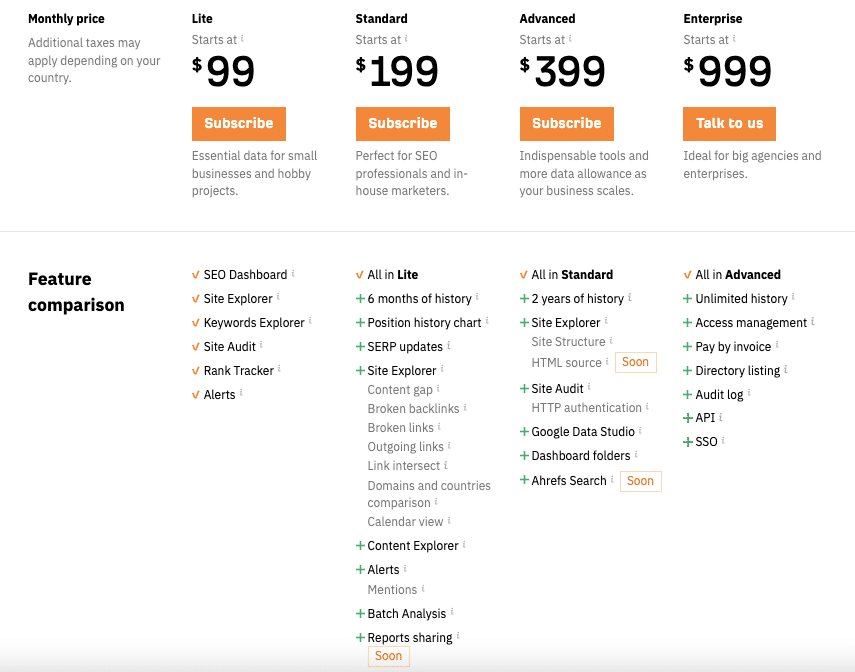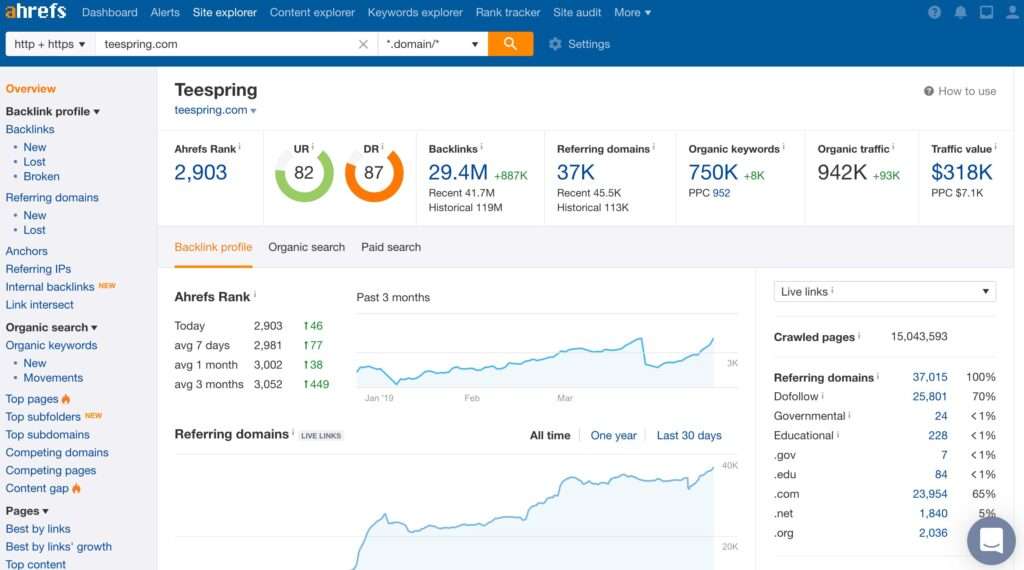The SEO industry is ever-changing and the tools that digital marketers use to optimize their websites are evolving alongside it. With so many SEO tools on the market, it can be difficult to choose which one is best for you, so we’ve put together this ultimate guide to help you decide.
Ahrefs is one of the most popular SEO tools in the industry. It offers a suite of features that are designed to help users analyze their site’s rankings, find out what keywords they rank for, identify broken links and crawl errors, track competitors’ backlinks, and more.
From analyzing the competition to tracking keyword performance, this tool will help you maximize your SEO efforts and improve your website’s visibility in search engine results pages (SERPs).
Quick Links
Brief Overview of Ahrefs
Ahrefs is a toolset for SEO and content marketing professionals. The toolset includes a variety of features such as keyword research, backlink analysis, and content analysis.
Ahrefs allows users to see the top organic search results for a specific keyword and also the keywords that a specific webpage is ranking for.
The tool also provides information on the number of backlinks a webpage has and the overall domain and page authority of a website.
Additionally, Ahrefs offers a feature called Site Explorer, which allows users to see the organic search traffic and organic search keywords for any website.
Overall, Ahrefs is a comprehensive toolset that provides valuable insights into a website’s search performance and can help with search engine optimization and content marketing efforts.
Ahrefs - Key Features and Options
Ahrefs is a powerful tool for SEO professionals, providing insights and data to help them make informed decisions about their websites. It can be used to analyze competitors’ websites, track keyword rankings, and research backlinks.
Backlink analysis: Ahrefs allows users to see the backlinks pointing to a specific webpage or domain. This feature can be used to identify potential link-building opportunities, as well as to monitor the backlinks of competitors.
Keyword research: Ahrefs provides detailed information about search volume, CPC, and competition for specific keywords. This feature can be used to identify potential keywords for content creation and SEO campaigns.
Content analysis: Ahrefs allows users to see the top organic search results for a specific keyword and also the keywords that a specific webpage is ranking for. This feature can be used to identify the most successful content in a specific niche and to optimize existing content.
Site Explorer: Ahrefs Site Explorer allows users to see the organic search traffic and organic search keywords for any website. This feature can be used to identify potential competitors and to track the progress of an SEO campaign.
Rank tracking: Ahrefs allows users to track the organic search rankings for specific keywords and web pages. This feature can be used to monitor the progress of an SEO campaign and to identify areas for improvement.
Alerts: Ahrefs allows users to set up alerts for specific keywords, backlinks, or domains. This feature can be used to stay informed about new backlinks or changes in search rankings.
Batch analysis: Ahrefs allows users to analyze multiple keywords, webpages, or domains at once. This feature can be used to quickly gather data on a large number of potential keywords or competitors.
API access: Ahrefs provides API access, allowing users to integrate Ahrefs data into their own tools or dashboards.
Integration with Google Analytics: Ahrefs can be integrated with Google Analytics to track the performance of an SEO campaign.
Historical data: Ahrefs provides historical data, allowing users to see the backlinks and search rankings of a website over time. This feature can be used to identify patterns and trends in a website’s search performance.
Ahrefs Resources
Ahrefs offers several resources to help users learn how to use the tool and improve their SEO and marketing efforts. These resources include:
Help center: The Ahrefs help center provides detailed information on how to use the various features of the tool, as well as troubleshooting guides and FAQs.
Blog: The Ahrefs blog provides in-depth guides and tutorials on a wide range of SEO and marketing topics, such as link building, keyword research, and content optimization.
Beginner’s Guide to SEO: Ahrefs has provided a comprehensive guide for SEO beginners, it covers all the basics of SEO, from keyword research to on-page optimization, and it’s a great starting point for anyone new to SEO.
Academy: Ahrefs Academy is an online SEO training platform with a variety of courses and certifications that cover different aspects of SEO, such as keyword research, link building, and content optimization.
All these resources are available on the Ahrefs website and are designed to help users make the most of the tool and improve their search engine optimization and marketing efforts.
Pricing Policy
Ahrefs is a tool that provides data and insights on backlinks, keywords, and other information related to website performance. The pricing for Ahrefs varies depending on the plan and the number of users. It offers several plans such as Lite, Standard, Advanced, and Enterprise.
The Lite plan starts at $99 per month, the Standard plan starts at $199 per month, the Advanced plan starts at $399 per month, and the Enterprise plan at $999 per month. Additionally, Ahrefs also offers a 7-day trial for $7.

Limitations and Drawbacks
Ahrefs is a powerful SEO tool that provides a wide range of data and insights to help improve website performance. However, like any tool, it has its limitations and drawbacks. Some of these include:
Cost: Ahrefs is a paid tool and can be expensive for smaller businesses and individuals on a budget.
Data Limitations: Ahrefs data is limited to backlinks and keywords, it doesn’t cover other important SEO metrics such as site speed, mobile optimization, and user experience.
Limited Historical Data: Ahrefs only provides data from the past 12 months, making it difficult to track long-term performance trends.
Limited Social Media Data: Ahrefs does not provide in-depth social media metrics, which can be important for understanding how a website is performing across different platforms.
Limited Support: Ahrefs has a limited support system, which can be a problem for users who need assistance with more complex features or issues.
Accuracy of data: Ahrefs data can have inaccuracies, mainly due to the dynamic nature of the web, and sometimes data may not be updated in real-time
Overall, Ahrefs is a powerful tool that can provide a wealth of valuable data and insights, but it may not be the best fit for every user or every budget.
Ahrefs: Key Terms Explained
Ahrefs is a powerful SEO tool that helps digital marketers and website owners to optimize their websites for search engine rankings. It uses a suite of tools to analyze a website’s content, backlinks, and other metrics in order to identify opportunities for improvement.
Ahrefs Rank: Ahrefs Rank (AR) is a metric used to measure the overall performance of a website. It is based on the number and quality of backlinks pointing to the website. Ahrefs Rank can be used to determine how popular or authoritative a website is compared to its competitors.
URL Rating (UR): URL Rating (UR) is a metric that shows the popularity and authority of a specific page on a scale of 1-100, similar to Ahrefs Rank but it is specific to a page. It is based on the number and quality of backlinks pointing to the specific page.
Domain Rating (DR): Domain Rating (DR) is a metric that shows the popularity and authority of a domain on a scale of 1-100, similar to Ahrefs Rank but it is specific to a domain. It is based on the number and quality of backlinks pointing to the domain.
Backlinks: Backlinks are links pointing to a website from other websites. Ahrefs provides data on the number and quality of backlinks pointing to a website, including the number of linking domains and the anchor text used in the links.
Referring Domains: Referring domains are the number of unique domains linking to a website. Ahrefs provides data on the number of referring domains, which can help identify potential link-building opportunities and identify any potential link-related issues.
Organic Keywords: Organic keywords are the keywords that people use to find a website on search engines. Ahrefs provides data on the organic keywords that are driving traffic to a website, including search volume, CPC, and competition level. This information can be used to identify new content and optimization opportunities.
Organic Traffic: Organic Traffic is the number of visitors to a website through unpaid search results. Ahrefs provides data on the amount of organic traffic a website receives, which can be used to track performance and identify areas for improvement.
Traffic Volume: Traffic Volume is the total number of visitors to a website. Ahrefs provides data on the total traffic volume of a website, which can be used to track performance and identify areas for improvement.
PPC Keywords: PPC keywords are the keywords that people use to find a website on search engines through paid advertising. Ahrefs provides data on the PPC keywords that are driving traffic to a website, including search volume, CPC, and competition level. This information can be used to identify new advertising opportunities and optimize existing campaigns.
Content Gap: Content Gap is a feature in Ahrefs that compares the content of a website to that of its competitors, identifying gaps and opportunities for creating new content. It can be used to identify new content ideas and improve existing content.
Ahrefs and Other SEO Tools
Ahrefs is a popular SEO tool that provides data and insights on backlinks, keywords, and other information related to website performance. However, it is not the only tool available on the market and there are other SEO tools that can be used for similar purposes. Here are a few comparisons of Ahrefs with some other popular SEO tools:
SEMrush: SEMrush is another powerful SEO tool that provides similar data and insights to Ahrefs, including backlink analysis, keyword research, and competitor analysis. However, SEMrush also offers additional features such as PPC, social media, and content marketing tools.
Moz: Moz is an SEO tool that provides data and insights on backlinks, keywords, and website performance. It also includes a feature called Domain Authority (DA) which is a metric that predicts how well a website will perform in search engine rankings. Ahrefs also has a similar metric called Domain Rating (DR)
Majestic: Majestic is an SEO tool that specializes in backlink analysis. It has a large link index and provides detailed information on the quality and quantity of backlinks to a website.
Google Analytics: Google Analytics is a free tool that provides data and insights on website performance, including traffic, bounce rate, and conversion rates. It doesn’t provide backlink analysis and keyword research features.
Ultimately, the best tool for you will depend on your specific needs and budget. It’s always a good idea to try out different tools and see which one works best for your particular situation.
Bottom Line
Ahrefs is a powerful SEO and content marketing tool that provides a wide range of data and insights to help improve website performance. The following is an overview of the tool’s pricing, features, options, resources, and limitations:
-
Pricing: Ahrefs has several plans such as Lite, Standard, Advanced and Agency. The Lite plan starts at $99 per month, the Standard plan starts at $199 per month, the Advanced plan starts at $399 per month, and the Enterprise plan is custom-priced. Additionally, Ahrefs also offers a 7-day trial for $7.
-
Features: Ahrefs provides a wide range of features, including backlink analysis, keyword research, content research, competitor analysis, site explorer, alerts, and more. These features provide detailed information on the quality and quantity of backlinks, keywords, and other information related to website performance.
-
Options: Ahrefs offers a variety of options to customize the tool to fit your specific needs, such as the ability to set up alerts for changes to your website or your competitors’ websites, customize the data and reports, and more.
-
Resources: Ahrefs provides a wealth of resources to help users understand and make the most of the tool, including a knowledge base, blog, and video tutorials.
-
Limitations: Ahrefs is a paid tool and can be expensive for smaller businesses and individuals on a budget. Ahrefs data is limited to backlinks and keywords, it doesn’t cover other important SEO metrics such as site speed, mobile optimization, and user experience. Ahrefs also only provides data from the past 12 months, making it difficult to track long-term performance trends and sometimes data may not be updated in real-time.
Sharing is Caring

























